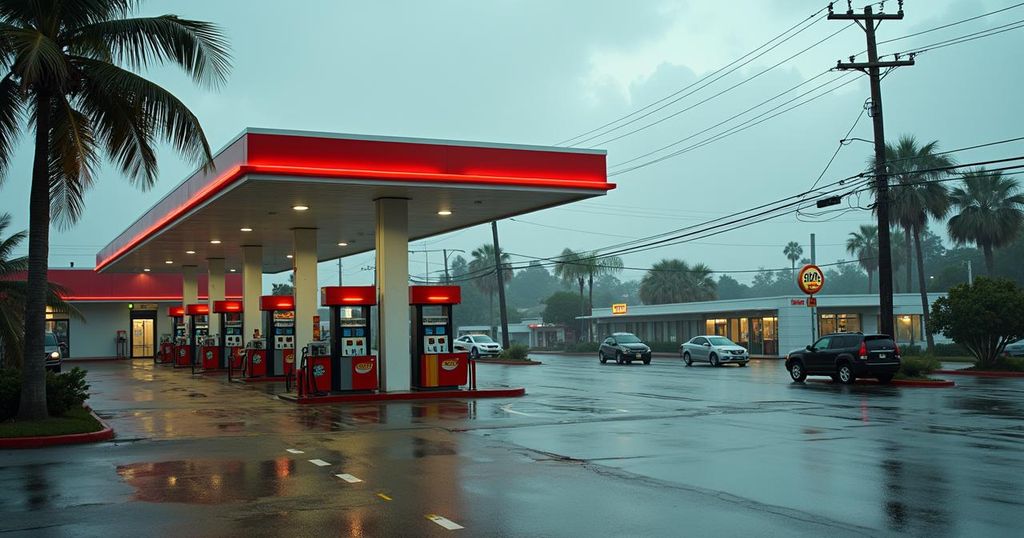Florida is grappling with a fuel shortage following Hurricane Milton, as residents return from evacuations and search for gas. Governor Ron DeSantis has initiated emergency fuel distribution, while the recovery from extensive storm damage continues. The economic impact of the hurricanes is estimated at billions, with safety concerns still prevalent in the affected regions.
Floridians are facing significant challenges in the aftermath of Hurricane Milton, as the state experiences a severe fuel shortage. On a recent Saturday, many residents returning home after evacuations were left searching for gas. In St. Petersburg, citizens formed long lines at a gas station that had run out of fuel, with no clear indication of when supplies would arrive. One individual, Daniel Thornton, described the situation, stating, “They told me they have gas coming but they don’t know when it’s going to be here. I have no choice. I have to sit here all day with her until I get gas.” In response to the crisis, Governor Ron DeSantis announced the establishment of three fuel distribution centers, with plans for more. Residents are permitted to receive up to ten gallons of fuel at no cost. Governor DeSantis commented that as power is restored and the Port of Tampa reopens, fuel supplies will improve, providing much-needed relief for residents. Similarly, officials are working to resupply gas stations by utilizing the state’s fuel stockpiles and deploying generators to those without electricity. As individuals assess the damages to their homes, many are confronted with additional challenges caused by the hurricane. Bill O’Connell, a board member at Bahia Vista Gulf in Venice, lamented, “It reflooded everything that was already flooded, brought all the sand back on our property that we removed.” In the fishing village of Cortez, residents are also grappling with the aftermath of two hurricanes, with many homes severely damaged and debris piling up in the streets. In Bradenton Beach, community members are coming together to aid one another, as exemplified by Jen Hilliard, who remarked, “Community is the best part, though. Everybody helping each other.” Meanwhile, Hurricane Milton has tragically claimed at least ten lives and led to over a thousand rescues across Florida, according to Governor DeSantis. President Joe Biden is scheduled to visit the affected areas to survey the damage, emphasizing the need for Congressional action to secure funding for recovery efforts. Early estimates suggest the economic impact of the storm could soar between $50 billion to $85 billion, further straining the recovery process. As Floridians continue to navigate safety concerns, including rising rivers and power outages affecting over 1.3 million residents, Meteorologist Paul Close warned that river levels would continue to rise for several days. Fortunately, there is no significant rain in the forecast, which provides a temporary reprieve from the severe weather conditions. In conclusion, Florida remains in a state of recovery following Hurricane Milton, marked by a fuel shortage, widespread destruction, and a determined community response. As leaders work to address immediate needs and secure federal assistance, residents are showing resilience and solidarity in the face of ongoing challenges.
The state of Florida recently faced the double blow of Hurricanes Helene and Milton, leading to critical infrastructure challenges, particularly concerning fuel supplies. As residents return home after evacuation, a fuel shortage has impeded recovery efforts. Governor Ron DeSantis has responded by implementing fuel distribution initiatives while residents grapple with the aftermath of the destruction caused by the hurricanes. The economic ramifications of these disasters are projected to be significant, estimated in the billions, highlighting the urgent need for coordinated recovery efforts and funding from the federal government.
The aftermath of Hurricane Milton has left Florida in a state of disarray, confronting significant challenges including fuel shortages, extensive property damage, and safety hazards. Authorities are taking steps to alleviate the fuel crisis, while residents are banding together to support one another during recovery efforts. The economic toll from the hurricanes is substantial, necessitating immediate federal assistance and a concerted recovery strategy to rebuild the affected communities. As the state manages the ongoing threat of flooding and infrastructure instability, the resilience of the community remains evident amidst the challenges they face.
Original Source: fortune.com







